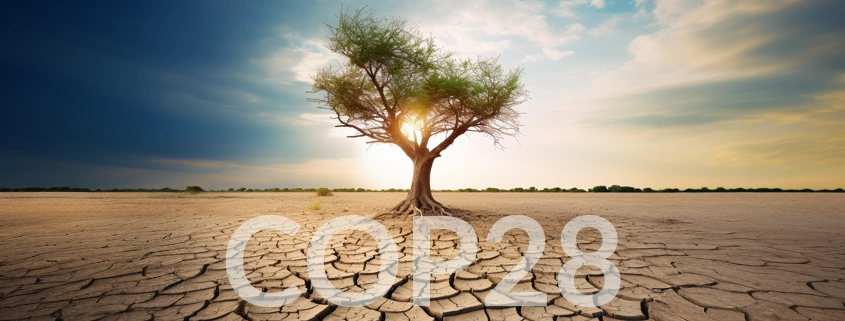The 28th session of the Conference of Parties (COP28) is the 2023 United Nations Climate Change Conference. Inaugurated in 1995, COP is an annual opportunity for signatories to the United Nations Framework Convention on Climate Change (UNFCCC) to debate solutions to climate change.
The key outcome of the COP process has been the 2015 Paris Agreement, signed by 195 parties, which saw the agreement to cut global greenhouse gas emissions to ensure global surface temperatures remain below 2 degrees Celsius (ideally 1.5 degrees Celsius) in order to prevent dangerous climate change.
COP26, which was held in Glasgow, built on the Paris Accord, with renewed commitments by signatory governments to reduce their greenhouse gas emissions. 190 countries agreed to the phasing out of coal for energy production which is widely regarded as one of the fastest and relatively easy ways to cut carbon emissions. Timeframes for emissions reduction targets were also established, though crucially not legally binding.
It was hoped that COP27, held in Sharm-el-Sheikh, Egypt, would build on this success and push targets to reduce greenhouse gas emissions even further as UN reports suggest current commitments of signatories to the Paris Agreement don’t go far enough to successfully limit global warming to under 1.5 degrees celsius (vs. 1990s levels).
COP27 was feted for the creation of the Loss and Damage Fund, primarily aimed at helping developing countries cover the cost of damage caused by natural disasters related to global warming, such as wildfires, rising sea levels, heatwaves, drought, and crop failure. Questions over how quickly the fund will be able to get up and running, and how effectively it is able to function remain, clouding initial jubilation.
COP27 was also characterised by a lack of commitment to completely phase out fossil fuels. The final commitment stated a need to “accelerate efforts towards the phase-down of unabated coal power and phase-out of inefficient fossil fuel subsidies.” This has been a major point of contention for the green lobby. As a result, Cop27 was greeted with an equal mix of celebration and frustration, so much now rests on Cop 28 being seen as a success, but it poses significant challenges.
The 2023 conference, COP28 takes place between November 30th and December 12th in Dubai. It marks a significant milestone with the completion of the first full assessment of the Paris Agreement begun at COP26. This “Global Stocktake” is intended to “assess the collective progress towards achieving the purpose of the Paris Agreement and its long-term goals.” It will explore how signatory countries are faring against the emissions-cutting commitments at an overall global level, identifying trends that should inform countries’ national climate commitments (NCC), which must be updated every five years. At COP27 governments were urged to revisit national climate plans to meet 2030 targets, and there is an expectation for them to demonstrate more ambitious climate strategies compared to those of 2022. This could well be contentious for some, including the UK, which has been accused of slowing rather than accelerating targets.
Financing action against climate change will without doubt be high on the agenda. In 2009, at COP15, developed countries committed to a collective goal of mobilising 100 billion USD per year by 2020 for climate action and mitigation efforts in developing countries. However, a subsequent lack of commitment to funding pledges has created an atmosphere of mistrust amongst some COP signatories. With no agreement reached at COP27 on how large the funding stream would be for the Loss and Damage Fund, who will be responsible for paying what, and who will be eligible to receive funding, there are urgent expectations for greater clarity of purpose to come out of COP28 to support developing countries.
The UAE’s priorities for its COP of course will include a focus on how to implement the policies that were agreed in Paris and Glasgow. It is already clear that COP28 will take place in the context of challenging geopolitical relations.
The production of oil, natural gas, and coal, which is responsible for as much as 79% of total emissions worldwide will be a point of issue, especially as only the phasing out of coal was a subject of a commitment at COP27. Businesses in the region are at an earlier stage in their sustainability journey and much of the current focus is on how to achieve a ‘just transition’ – making sure that global decarbonisation efforts are equitable, fair, and inclusive. Expectations will also be muddied by the ongoing conflict between Russia and Ukraine and rising tensions in the Middle East, both areas being major suppliers of oil and gas. Though expectation is for one of greater impetus in the drive toward non-fossil and renewable alternatives to ensure fuel security in developed nations.
Alok Sharma, the UK Conservative MP and former minister who led the Cop26 talks in Glasgow in 2021, says the task is clear, “Cop28 must deliver strengthened emissions reduction targets, and a commitment to peak global emissions by 2025,” he said. “There must be a plan to turbocharge the clean energy revolution, and a commitment to phase out fossil fuels. And a meaningful agreement on how to scale up finance, both public and private, to support developing nations to decarbonise their economies – moving from the billions to the trillions.”
Read more about how you can embrace net zero in your buildings.













